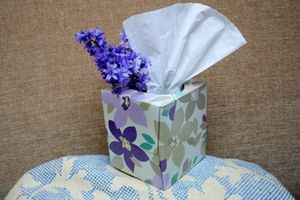 My wife says I’m an optimist. But when it comes to the recent cold, wet weather we’ve been having, there really is a silver lining in all that gray — it’s keeping the pollen counts down, even during the peak of allergy season.
My wife says I’m an optimist. But when it comes to the recent cold, wet weather we’ve been having, there really is a silver lining in all that gray — it’s keeping the pollen counts down, even during the peak of allergy season.
And allergy season is serious business. Since the ol’ Gipper (that would be President Reagan, for my younger readers) first declared it in 1984, the month of May has been known as National Allergy and Asthma Awareness Month.
Given the stupefying side-effects of antihistamines like benadryl, it’s also no wonder that the Zombie Research Society has also declared May to be Zombie Awareness Month. (Note: not an official presidential designation, despite the powerful zombie lobby.) Then again, given the fantastic number of presidential proclamations that are issued each year, who’s to say The White House could not have slipped it in when no one was paying attention.
Locals always claim the Willamette Valley is one of the worst allergy locations in the country. Yet somehow, Portland ranks among the least affected cities on the Asthma and Allergy Foundation of America’s “Allergy Capitals.” That’s right folks — Stumptown scored a low 89th out of 100 major US metropolitan areas.
My nose would beg to differ, but such is the injustice of composite scoring systems. Just ask the administrators of Reed College, who have been speaking out on the flaws of US News and World Report’s college ranking methodology for years now.
I realize your watering eyes may not be able to take much more of my digressions, so here are my top allergy treatment recommendations:
- Behavioral adaptations should always be first on the list. Exercise indoors, or outdoors only at times of low pollen (usually in the evening). Keep windows and doors shut at all times. Trimming fingernails short and showering after outdoor activity both help to keep pollens off your body.
- If you need allergy medication, the single most effective treatment is nasal steroid spray. I have found that controlling symptoms at the nose provides nice carryover benefits to eye and throat complaints as well. Choice of brand is up to you — they’re basically all the same. So go with the generic fluticasone (Flonase).
- Need more horsepower? Add a sedating antihistamine like diphenhydramine 25mg (generic benadryl) at night. Yes, it makes you sleepy, but you’re going to sleep anyway. And it’s far more effective than claritin or allegra — not to mention dirt-cheap.
- For eye symptoms, use zaditor drops. They’re even OTC to boot, so you don’t need a prescription.
- Still symptomatic? A nonsedating antihistamine like claritin or allegra during the day is my fourth-line recommendation. Your doctor can prescribe several additional medications like antihistamine nasal sprays (astelin), selective leukotriene receptor antagonists (singulair), and even oral steroids (prednisone) if necessary.
- Remember that treatment is additive, so if one medication is ineffective, you add to it a second drug, then a third, and so on.
- For those whom medication does not help, allergen injection immunotherapy (allergy shots) is a proven treatment (but time-consuming and expensive).
- Lastly, forget honey therapy. Honey was found to be ineffective in a well-done (though small) study of 36 allergy sufferers. Participants were randomized to a daily tablespoon of either local raw, nationally processed, or artificial honey supplements. There was no difference in patient-reported symptoms over a 180-day monitoring period.
